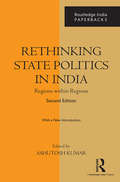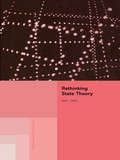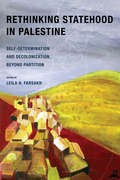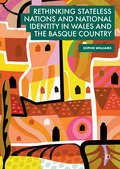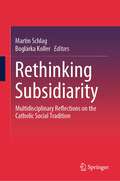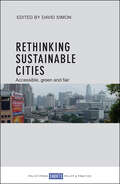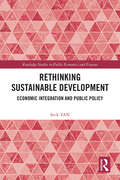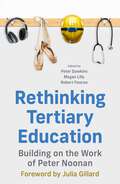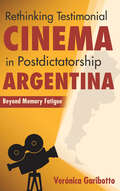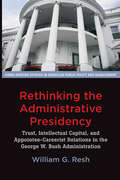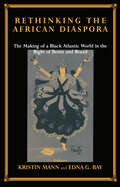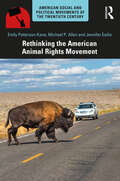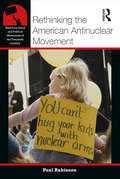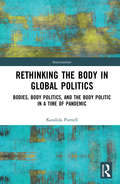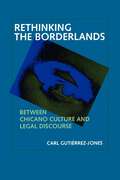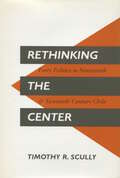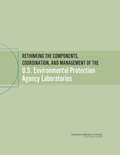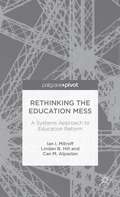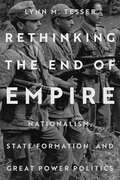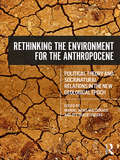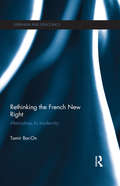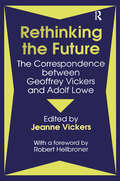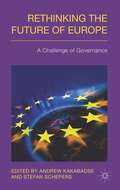- Table View
- List View
Rethinking State Politics in India: Regions within Regions
by Ashutosh KumarIn recent decades, India has been witness to the assertion of geographically, culturally and historically constituted distinct and well-defined regions that display ethnic, communal, caste and other social–political cleavages. This book examines the changing configurations of state politics in India. Focussing on identity politics and development, it explores the specificities of the regions within states — not merely as politico-administrative constructs but also as conceived in historical, geographic, economic, sociological or cultural terms. Adopting a comparative approach, the book looks at alternative theoretical approaches — the quest for homeland, identity, caste politics and public policy. This second edition includes a new Introduction that updates the research in the area, while further developing the theoretical framework. One of the first major volumes on federalism in India, including studies from across the nation, this book will be indispensable for students and scholars of political science, sociology, history and South Asian studies.
Rethinking State Theory (Routledge Innovations in Political Theory #3)
by Mark J Smith Mark J. SmithIn the last two decades, objects of analysis such as 'the state' have increasingly been seen as uncertain and contested theoretical concepts. Mark J. Smith presents a counter argument that highlights how existing theoretical approaches can provide useful tools for understanding contemporary political developments.
Rethinking Statehood in Palestine: Self-Determination and Decolonization Beyond Partition (New Directions in Palestinian Studies #4)
by Leila H. FarsakhA free open access ebook is available upon publication. Learn more at www.luminosoa.org. The quest for an inclusive and independent state has been at the center of the Palestinian national struggle for a very long time. This book critically explores the meaning of Palestinian statehood and the challenges that face alternative models to it. Giving prominence to a young set of diverse Palestinian scholars, this groundbreaking book shows how notions of citizenship, sovereignty, and nationhood are being rethought within the broader context of decolonization. Bringing forth critical and multifaceted engagements with what modern Palestinian self-determination entails, Rethinking Statehood sets the terms of debate for the future of Palestine beyond partition.
Rethinking Stateless Nations and National Identity in Wales and the Basque Country
by Sophie WilliamsThis book looks at the fundamental components of national identity as understood by ordinary nation members, and the way in which it is mobilised by political elites. Drawing on an original case comparison between Wales and the Basque Country, the author suggests there are many commonalities between these two nations, particularly around the fundamentals of their national identities. However, differences occur in terms of degree of intensity of feeling and around the politicisation of identity, with more entrenched and hostile political positioning in the Basque Country than Wales. Through a multi-level comparison, the book generates insights into national identity as a theoretical concept and in a ‘stateless nation’ context. It argues for national identity's intangible, yet polemical, nature, looking at the primordialist way it is understood, its permanence and importance, coupled with its lack of everyday salience and consequent obligations.
Rethinking Subsidiarity: Multidisciplinary Reflections on the Catholic Social Tradition
by Martin Schlag Boglárka KollerThis book takes a fresh and interdisciplinary approach to the concept of subsidiarity. While subsidiarity is commonly understood as an organizational principle that assigns competences to the appropriate level within an organization, its application extends beyond politics. This innovative book offers a comprehensive analysis that includes religious and secular perspectives, exploring the relevance of subsidiarity to society, business, law and politics.By bridging the gap between theology, philosophy, political science, law, and history, this volume fills a significant gap in the literature. It reexamines the ideological foundations of subsidiarity within the Catholic social tradition, investigates its practical implications, and questions how it can address the challenges faced by contemporary business environments, particularly issues of social inequity. With a normative and conceptual approach, the book critically reflects on the links between subsidiarity and themes such as responsible business practices, ecological concerns, individual autonomy, and the common good. By exploring the potential of subsidiarity to overcome dichotomies and promote a middle ground between government-based solutions and individual freedom, the volume offers valuable insights and practical solutions.This volume stands out as the first major study dedicated to subsidiarity in society, business, law and politics. Through its multidisciplinary lens, it sheds light on unexplored connections and highlights the role of subsidiarity in fostering ethical and socially responsible behavior. It is an essential resource for researchers, PhD and graduate students, as well as professionals in theology, philosophy, political sciences, law, and history who seek a comprehensive understanding of subsidiarity and its implications for contemporary issues.
Rethinking Sustainable Cities: Accessible, Green and Fair
by David SimonAvailable Open Access under CC-BY-NC licence. Sustainable urbanisation has moved to the forefront of global debate, research and policy agendas over recent years. Rapid urbanisation throughout China, India and many other low and middle income countries poses new challenges both locally and internationally at a time when urban areas worldwide are threatened by climate/environmental change. This compact book is designed to make a signal contribution to the sustainable urbanisation agenda through authoritative interventions contextualising, assessing and explaining clearly the relevance and importance of three central characteristics of sustainable towns and cities everywhere, namely that they should be accessible, green and fair. These three terms form key tenets of the work of Mistra Urban Futures (MUF), an international research centre on sustainable urbanisation based in Gothenburg, Sweden, and working through transdisciplinary research platforms there, in Greater Manchester (UK), Cape Town (South Africa) and Kisumu (Kenya). Additional platforms are being established in southern Sweden, Asia and Africa.
Rethinking Sustainable Development: Economic Integration and Public Policy (Routledge Studies in Public Economics and Finance)
by Seck TANThis book demonstrates falsified economic performance of global economies when the environment is not recognised as a capital, and when the ecosystem is overlooked towards sustainable development.Seck begins with an analysis of standard macroeconomic framework and policy practice. He argues, with reference to environmental accounting literature, that environmental capital must form an integral component of economic measurement. This paves the way for an alternative environmental-macroeconomics framework for policy analysis that promotes sustainable development. The book demonstrates how environmental capital can be measured with reference to select OECD countries and provides a methodology for analysing how macroeconomic goals are related to a steady-state economy. Seck then concludes with a summary of the conflict between current economic growth and ecosystem preservation, and outlines possible policy improvements and directions for research.Rethinking Sustainable Development is an invaluable reference for policymakers as well as researchers and students of environmental economics, sustainable development, and macroeconomics.
Rethinking Tertiary Education: Building on the work of Peter Noonan
by Peter Dawkins Megan Lilly Robert PascoeThe future of Australia as a post-industrial economy depends on how knowledge, skills and capabilities are learned and fostered. Every Australian will need to engage with the tertiary education system, both to acquire an initial qualification and to up-skill or re-skill over the course of their lives. The time has come to address the divide between vocational and higher education and implement a reform agenda that has been in development over the last decade. This will involve reforming the Australian Qualifications Framework to give greater recognition to skills alongside knowledge, and enable the vocational and higher education sectors to design fit-for-purpose courses. It will also require reform of the pathways, partnerships, curriculum, funding and regulation and to provide the coherence, quality, navigability and relevance needed for students, providers and industry. The central figure in the development of this policy agenda was Peter Noonan, professor of Tertiary Education at Victoria University, who sadly passed away in 2022 after forty years as Australia's leading tertiary education policy thinker and adviser to both sides of government.
Rethinking Testimonial Cinema in Postdictatorship Argentina: Beyond Memory Fatigue (New Directions in National Cinemas)
by Verónica GaribottoFor roughly two decades after the collapse of the military regime in 1983, testimonial narrative was viewed and received as a privileged genre in Argentina. Today, however, academics and public intellectuals are experiencing "memory fatigue," a backlash against the concepts of memory and trauma, just as memory and testimonial films have reached the center of Argentinian public discourse. In Rethinking Testimonial Cinema in Postdictatorship Argentina, Verónica Garibotto looks at the causes for this reticence and argues that, rather than discarding memory texts for their repetitive excess, it is necessary to acknowledge them and their exhaustion as discourses of the present.By critically examining how trauma theory and subaltern studies have previously been applied to testimonial cinema, Garibotto rereads Argentinian films produced since 1983 and calls for an alternate interpretive framework at the intersection of semiotics, theories of affect, scholarship on hegemony, and the ideological uses of documentary and fiction. She argues that recurrent concepts—such as trauma, mourning, memory, and subalternity—miss how testimonial films have changed over time, shifting from subaltern narratives to official, hegemonic, and iconic accounts. Her work highlights the urgent need to continue to study these types of narratives, particularly at a time when military dictatorships have become entrenched in Latin America and memory narratives proliferate worldwide. Although Argentina is Garibotto's focus, her theory can be adapted to other contexts in which narratives about recent political conflicts have shifted from alternative versions of history to official, hegemonic accounts—such as in Spanish, Chilean, Uruguayan, Brazilian, South African, and Holocaust testimonies. Garibotto's study of testimonial cinema moves us to pursue a broader ideological analysis of the links between film and historical representation.
Rethinking the 1950s
by Jennifer A. DeltonHistorians generally portray the 1950s as a conservative era when anticommunism and the Cold War subverted domestic reform, crushed political dissent, and ended liberal dreams of social democracy. These years, historians tell us, represented a turn to the right, a negation of New Deal liberalism, an end to reform. Jennifer A. Delton argues that, far from subverting the New Deal state, anticommunism and the Cold War enabled, fulfilled, and even surpassed the New Deal's reform agenda. Anticommunism solidified liberal political power and the Cold War justified liberal goals such as jobs creation, corporate regulation, economic redevelopment, and civil rights. She shows how despite President Eisenhower's professed conservativism, he maintained the highest tax rates in US history, expanded New Deal programs, and supported major civil rights reforms.
Rethinking the Administrative Presidency: Trust, Intellectual Capital, and Appointee-Careerist Relations in the George W. Bush Administration (Johns Hopkins Studies in American Public Policy and Management)
by William G. ReshThe first book to explore the tension between presidents and federal agencies from the perspective of careerists in the executive branch.Winner of the Herbert A. Simon Book Award of the American Political Science AssociationWhy do presidents face so many seemingly avoidable bureaucratic conflicts? And why do these clashes usually intensify toward the end of presidential administrations, when a commander-in-chief’s administrative goals tend to be more explicit and better aligned with their appointed leadership’s prerogatives? In Rethinking the Administrative Presidency, William G. Resh considers these complicated questions from an empirical perspective.Relying on data drawn from surveys and interviews, Resh rigorously analyzes the argument that presidents typically start from a premise of distrust when they attempt to control federal agencies. Focusing specifically on the George W. Bush administration, Resh explains how a lack of trust can lead to harmful agency failure. He explores the extent to which the Bush administration was able to increase the reliability—and reduce the cost—of information to achieve its policy goals through administrative means during its second term.Arguing that President Bush's use of the administrative presidency hindered trust between appointees and career executives to deter knowledge sharing throughout respective agencies, Resh also demonstrates that functional relationships between careerists and appointees help to advance robust policy. He employs a "joists vs. jigsaws" metaphor to stress his main point: that mutual support based on optimistic trust is a more effective managerial strategy than fragmentation founded on unsubstantiated distrust.
Rethinking the Administrative Presidency: Trust, Intellectual Capital, and Appointee-Careerist Relations in the George W. Bush Administration (Johns Hopkins Studies in American Public Policy and Management)
by William G. ReshThe first book to explore the tension between U.S. presidents and federal agencies from the perspective of careerists in the executive branch.Why do presidents face so many seemingly avoidable bureaucratic conflicts? And why do these clashes usually intensify toward the end of presidential administrations, when a commander-in-chief’s administrative goals tend to be more explicit and better aligned with their appointed leadership’s prerogatives? In Rethinking the Administrative Presidency, William G. Resh considers these complicated questions from an empirical perspective.Relying on data drawn from surveys and interviews, Resh rigorously analyzes the argument that presidents typically start from a premise of distrust when they attempt to control federal agencies. Focusing specifically on the George W. Bush administration, Resh explains how a lack of trust can lead to harmful agency failure. He explores the extent to which the Bush administration was able to increase the reliability—and reduce the cost—of information to achieve its policy goals through administrative means during its second term.Arguing that President Bush’s use of the administrative presidency hindered trust between appointees and career executives to deter knowledge sharing throughout respective agencies, Resh also demonstrates that functional relationships between careerists and appointees help to advance robust policy. He employs a “joists vs. jigsaws” metaphor to stress his main point: that mutual support based on optimistic trust is a more effective managerial strategy than fragmentation founded on unsubstantiated distrust.“An original and valuable book that extends the literature on the administrative presidency. A must-read.” —Hal G. Rainey, The University of Georgia, author of Understanding and Managing Public Organizations
Rethinking the African Diaspora: The Making of a Black Atlantic World in the Bight of Benin and Brazil
by Kristin Mann Edna G. BayAs a result of new research, we can now paint a more complex picture of peoples and cultures in the south Atlantic, from the earliest period of the slave trade up to the present. The nine papers in this volume indicate that a dynamic and continuous movement of peoples east as well as west across the Atlantic forged diverse and vibrant re-inventions and re-interpretations of the rich mix of cultures represented by Africans and peoples of African descent on both continents.
Rethinking the American Animal Rights Movement (American Social and Political Movements of the 20th Century)
by Emily Patterson-Kane Michael P. Allen Jennifer EadieAlong with Civil Rights and Women’s liberation, Animal Rights became one of leading social moments of the twentieth century. This book critically reviews all principal contributions to the American animal rights debate by activists, campaigners, academics, and lawyers, while placing animal rights in context with other related and competing movements. Rethinking the American Animal Rights Movement examines the strategies employed within the movement to advance its goals, which ranged from public advocacy and legal reforms to civil disobedience, vigilantism, anarchism, and even "terrorism." It summarizes key theoretical and legal frameworks that inspired those strategies, as well as the ideological motivations of the movement. It highlights the irreconcilable tension between moral and legal rights verses "humane treatment of animals" as prescribed by advocates of animal welfarism. The book also looks back to the nineteenth century origins of the movement, examining its appeal to a sentimentalist conception of rights standing in marked contrast with twentieth century rights theory. After providing an extensive social history of the twentieth century movement, the book subsequently offers a diagnosis of why it stalled at the turn of millennium in its various efforts to advance the cause of nonhuman animals. This diagnosis emphasizes the often-contradictory goals and strategies adopted by the movement in its different phases and manifestations across three centuries. The book is unique in presenting students, activists, and scholars with a history and critical discussion of its accomplishments, failures, and ongoing complexities faced by the American animal rights movement.
Rethinking the American Antinuclear Movement (American Social and Political Movements of the 20th Century)
by Paul RubinsonThe massive movement against nuclear weapons began with the invention of the atomic bomb in 1945 and lasted throughout the Cold War. Antinuclear protesters of all sorts mobilized in defiance of the move toward nuclear defense in the wake of the Cold War. They influenced U.S. politics, resisting the mindset of nuclear deterrence and mutually-assured destruction. The movement challenged Cold War militarism and restrained leaders who wanted to rely almost exclusively on nuclear weapons for national security. Ultimately, a huge array of activists decided that nuclear weapons made the country less secure, and that, through testing and radioactive fallout, they harmed the very people they were supposed to protect. Rethinking the American Antinuclear Movement provides a short, accessible overview of this important social and political movement, highlighting key events and figures, the strengths and weaknesses of the activists, and its lasting effects on the country. It is perfect for anyone wanting to obtain an introduction to the American antinuclear movement and the massive reach of this transnational concern.
Rethinking the Body in Global Politics: Bodies, Body Politics, and the Body Politic in a Time of Pandemic (Interventions)
by Kandida PurnellThis book rethinks the body in global politics and the particular roles bodies play in our international system, foregrounding processes and practices involved in the continually contested (re/dis)embodiment of both human bodies and collective bodies politic. Purnell provides a new, innovative, and detailed theory of bodily (re)making and un-making that shows how bodies are simultaneously (re)made and moved and (re)make and move other bodies and things. Presented in the form of reflective/reflexive and theoretically innovative essays, the book explores: bodies in general and their precarious, excessive, ontologically insecure, and emotional facets; the fleshing out of contemporary necro(body)politics; and the visual-emotional politics embodied through the COVID-19 pandemic. The empirical analyses feed into contemporary IR debates on British and American politics and international relations and the Global War on Terror, while also speaking to broader and interdisciplinary, theoretical literature on bodies/embodiment, visual politics, biopolitics, necropolitics, and affect/emotion, and feelings.
Rethinking the Borderlands: Between Chicano Culture and Legal Discourse (Latinos in American Society and Culture #4)
by Carl Gutiérrez-JonesChallenging the long-cherished notion of legal objectivity in the United States, Carl Gutiérrez-Jones argues that Chicano history has been consistently shaped by racially biased, combative legal interactions. Rethinking the Borderlands is an insightful and provocative exploration of the ways Chicano and Chicana artists, writers, musicians, and filmmakers engage this history in order to resist the disenfranchising effects of legal institutions, including the prison and the court.Gutiérrez-Jones examines the process by which Chicanos have become associated with criminality in both our legal institutions and our mainstream popular culture and thereby offers a new way of understanding minority social experience. Drawing on gender studies and psychoanalysis, as well as critical legal and race studies, Gutiérrez-Jones's approach to the law and legal discourse reveals the high stakes involved when concepts of social justice are fought out in the home, in the workplace and in the streets.
Rethinking the Center: Party Politics in Nineteenth- and Twentieth-Century Chile
by Timothy R. ScullyFrom their beginnings in the mid-nineteenth century through the 1980's, political parties in Chile have displayed three discrete ideological tendencies, with two at opposite ends of the political spectrum and at least one in the center. This tripartite distribution made Chile's party system unlike any other in Latin America. How did Chile's distinctive system evolve? This book finds the answer in how three basic social cleavages—religious, urban, and rural—became polarized at three periods of "critical juncture." Clerical-anticlerical conflict gave initial definition to the party system in the period 1857-61, and continued to shape the political arena long after specific issues had receded into the background. Then, between 1920 and 1932, class conflict in the urban and mining enclave sectors forced party elites to respond to the demands of leaders of middle-sector and working groups for increased political and social power. This was the second of what the author calls Chile's "critical junctures" for party formation. The third, occurring in the period 1952-58, saw the spread of working-class politics into the countryside. Crucial here was a shift in the position of the Catholic Church on class conflict, resulting in the emergence of an important Church-inspired center party. The book compares the behavior of the political center during the three historical periods and suggests a conceptual framework for understanding different types of center parties. The author also addresses certain questions raised by the emergence and behavior of center parties: What were the implications of the presence of a center party for the patterns of party competition? Why did the center emerge and re-emerge at each critical point in the evolution of Chile's party system? Can this be understood in terms of an underlying coalitional logic, or are factors such as leadership, political choice, and historical accident more useful explanations? Consistent with this focus on the center is a new account of the key role of the Christian Democrats in the reconstitution of party competition in the late 1980's and early 1990's. The author concludes by offering some observations on the probable shape of party politics—and the role of the political center within it—in tomorrow's Chile.
Rethinking the Components, Coordination, and Management of the U.S. Environmental Protection Agency Laboratories
by Committee on Strengthening the US Environmental Protection Agency Laboratory Enterprise: Phase 1--Priority Needs Guiding Principles Overall GoalsThe Environmental Protection Agency (EPA) applies scientific results that have been provided by various parts of its own organization and by external organizations. The agency requires substantial high-quality inhouse scientific expertise and laboratory capabilities so that it can answer questions related to regulation, enforcement, and environmental effects of specific chemicals, activities, and processes. It is also usually faced with situations in which research or analytic work is time-critical, so it maintains dedicated laboratory staff and facilities that can respond quickly to such needs. In recent years, EPA has made several changes to improve the efficiency and effectiveness of its laboratories, such as the designation of national program directors to align the work of research laboratories with the needs of the agency's regulatory program offices. The agency is currently undertaking an integrated evaluation of it laboratories to enhance the management effectiveness and efficiency of its laboratory enterprise and to enhance its capabilities for research and other laboratory-based scientific and technical activities. The results of EPA's evaluation are expected to include options for colocation and consolidation of laboratory facilities. Rethinking the Components, Coordination, and Management of U. S. Environmental Protection Agency Laboratories assesses EPA's highest-priority needs for mission-relevant laboratory science and technical support, develops principles for the efficient and effective management of EPA's laboratory enterprise to meet the agency's mission needs and strategic goals, and develops guidance for enhancing efficiency and effectiveness now and during the next 10 years. EPA's laboratories play a vital role in the agency's work. The findings and recommendations of this report will help EPA to develop an implementation plan for the laboratory enterprise.
Rethinking the Education Mess: A Systems Approach to Education Reform
by Ian I. Mitroff Lindan B. Hill Can M. AlpaslanUsing a form of systems thinking, this book analyzes K-12 education as a complex, "messy" system that must be tackled as a whole and provides a series of heuristics to help those involved in the education mess to improve the system as a whole.
Rethinking the End of Empire: Nationalism, State Formation, and Great Power Politics
by Lynn M. TesserWhy did a nation-state order emerge when nationalist activism was usually an elitist pursuit in the age of empire? Ordinary inhabitants and even most indigenous elites tended to possess religious, ethnic, or status-based identities rather than national identities. Why then did the desires of a typically small number result in wave after wave of new states? The answer has customarily centered on the actions of "nationalists" against weakening empires during a time of proliferating beliefs that "peoples" should control their own destiny. This book upends conventional wisdom by demonstrating that nationalism often existed more in the perceptions of external observers than of local activists and insurgents. Lynn M. Tesser adds nuance to scholarship that assumes most, if not all, pre-independence unrest was nationalist and separatist, and sheds light on why the various demands for change eventually coalesced around independence in some cases but not others.
Rethinking the Environment for the Anthropocene: Political Theory and Socionatural Relations in the New Geological Epoch
by Manuel Arias-Maldonado Zev TrachtenbergThis book brings together the most current thinking about the Anthropocene in the field of Environmental Political Theory ('EPT'). It displays the distinctive contribution EPT makes to the task of thinking through what 'the environment' means in this time of pervasive human influence over natural systems. Across its chapters the book helps develop the idea of 'socionatural relations'—an idea that frames the environment in the Anthropocene in terms of the interconnected relationship between human beings and their surroundings. Coming from both well-established and newer voices in the field, the chapters in the book show the diversity of points of view theorists take toward the Anthropocene idea, and socionatural relations more generally. However, all the chapters exemplify a characteristic of work in EPT: the self-conscious effort to provide normative interpretations that are responsive to scientific accounts. The Introduction explains the complicated interaction between science and EPT, showing how it positions EPT to consider the Anthropocene. And the Afterword, by a pioneer in the field, relates all the chapters to a perspective that has been deeply influential in EPT. This book will be of interest to scholars already engaged in EPT. But it will also serve as an introduction to the field for students of Political Theory, Philosophy, Environmental Studies, and related disciplines, who will learn about the EPT approach from the Introduction, and then see it applied to the pressing question of the Anthropocene in the ensuing chapters. The book will also help readers interested in the Anthropocene from any disciplinary perspective develop a critical understanding of its political meanings.
Rethinking the French New Right: Alternatives to Modernity (Extremism and Democracy)
by Tamir Bar-OnThis book focuses on the philosophy, politics and impact of the 'New Right' which originated in France and has since influenced activism, ideology and policy in a number of European countries. This book explores the idea that revolutionaries do not necessarily need to come from the left, nor use arms in order to overturn liberal democracy. In the post-World War Two era, the extremists of the revolutionary right took three different paths: 1) parliamentary; 2) extra-parliamentary; and 3) metapolitical. The New Right (nouvelle droite – ND in France) took the metapolitical path, but that did not mean it abandoned its revolutionary desire to smash liberal democracy throughout Europe. The book examines four interpretations of the New Right. These interpretations include the following: 1) The New Right as a fascist or quasi-fascist movement; 2) The New Right as a challenge to the traditional right-left dichotomy, which has structured European political debates for more than 200 years; 3) The New Right as an alternative modernist movement, which rejects liberal and socialist narratives of modernity; accepts the technical but not political or cultural effects of modernity; and longs for a pan-European political framework abolishing liberal multiculturalism and privileging ethnic dominance of so-called original Europeans; and 4) The New Right as a variant of political religion and conversionary processes. The book concludes by analysing the positions, cultural and political impact, and relationship to democracy of the New Right. This work will be of great interest to students and scholars of racism, fascism, extremism, European politics, French politics and contemporary political theory.
Rethinking the Future: Correspondence Between Geoffrey Vickers and Adolph Lowe
by P. Jeanne VickersRethinking the Future is the story of a relationship between two highly original thinkers who achieved great distinction in their chosen fields and in their respective countries. After a distinguished career in law, civil administration, and industrial management, Geoffrey Vickers made an exceptional contribution to academic debate with regard to ethics, epistemology, and "governance" - the art of maintaining stable relationships over time. One of the most eminent scholars of political economics in the Western world and a gifted teacher, Adolph Lowe inspired generations of economics students at the New School for Social Research in New York, and has published a number of seminal books on the subject. The friendship between the two was very close, taking shape through a correspondence and occasional visits to one side or the other of the Atlantic. It lasted more than forty years.This volume reflects the extraordinarily wide-ranging nature of the correspondence between Lowe and Vickers, and the continuing discussion of what it means to be human at the end of the twentieth century. The letters provide a personal commentary on some of the major events of this century, including many that were highly controversial. The book shows how these two scholars contributed to the development of the central ideas of the century. They are particularly relevant to present concerns, dealing as they do with economics and management, social and political sciences, governance and public policy. Discussing major national and international problems from very different - and sometimes opposite - standpoints, the two men are able, through this extraordinary correspondence, to formulate ideas of great wisdom and foresight with regard to the world that awaits us as the twenty-first century appears on the horizon. Economists, political scientists, and sociologists will find this correspondence stimulating and enlightening.
Rethinking the Future of Europe
by Stefan Schepers Andrew KakabadseRethinking the Future of Europe has brought together three contrasting collections of contributions: the incrementalist perspective concerning the step-by-step development of Europe, the more radical reform/restructuring approach to the future of Europe and a view of Europe from the outside. This book features a wide variety of contributions, both in content and focus, with some written as an almost after-dinner discussion while others are deeply academic, supported by an extensive list of references. What holds all together is the deep-seated concern for the citizen, drawing on governance in order to move forward. As Europeans, we are privileged to face such challenge.
